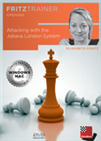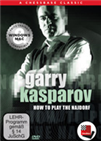“The situation is becoming really serious,” said a high ranking FIDE official. “It is especially due to computerised openings preparation. We must imagine a situation, in a few years from today, when grandmasters will play the first 25 moves of their game in less than a minute — after which one player will fall into thought, and after half an hour he will resign the game! He will have recognized that his opponent had a prepared line that is completely winning.”
 The Jobava London System is a minor form of the London System. White tries to play Lf4 quickly followed by Nc3.
The Jobava London System is a minor form of the London System. White tries to play Lf4 quickly followed by Nc3.So what has FIDE decided to do to alleviate the situation? Make use of a trend that organisers have been experimenting with, more and more often, in the past few years: Freestyle Chess – also known as Fischer Random or Chess 960. This form of chess has shown how the game can proceed with both players thinking creatively about every move from the start of the game.
Now FIDE intends to switch chess fully to Freestyle. How will this be implemented? Article 2.3 of the FIDE’s “Laws of chess” shows the “initial position of the pieces on the chessboard as it is currently used.” From 2025, it will be changed to read:
Every year, on the 2nd of January, ten initial positions of the pieces on the chessboard, will be picked by respected experts, from a list of 958 Freestyle positions.
That means we will get ten positions, selected from all possible Freestyle positions, with the exception of the traditional starting position, which is Fischer Random position 518, and its mirror position.
In any tournament or Open, thirty minutes before the start of each round, one of the ten positions will be selected at random and announced to the participants. This means that the players will have half an hour to prepare for their game with the starting position that has been selected.
Why restrict the choice to ten positions, why not select the starting position of each round at random from all 958 Freestyle positions? We asked the FIDE experts in charge of the change to explain. He said:
Well, first of all, a great number of the 960 positions are very strange. They lead to unattractive games. But more importantly, we should remember that preparation has always been part of the game, and we do not want to suddenly eliminate it completely. Players will be able to do a certain amount of preparation for ten positions – knowing full well that in 12 months, in 365 days, that preparation will become obsolete and can be thrown away.
Future World Championship matches
In addition to the revised Article 2.3, FIDE is implementing a special rule for World Championship matches. There, one position, which will be played in all the games, will be selected and revealed to the players one day before the match begins. This gives them a restricted amount of time to prepare, while at the same time avoiding a match that is a pure battle of preparation.
 A possible World Championship starting position (not actually selected)
A possible World Championship starting position (not actually selected)
So, starting from January 2nd 2025, no more games with the standard starting position will be sanctioned or rated by FIDE. We are told that the sudden switch to Freestyle was decided in large part due to the great success of the Weissenhaus tournament and the interest it generated among organisers and chess fans.
 Between 2004 and 2007 the 13th World Champion Garry Kasparov recorded a large 3-volume Najdorf video course. ChessBase is publishing this great classic in a complete edition in the current ChessBase Media format. Look forward to this classic of chess!
Between 2004 and 2007 the 13th World Champion Garry Kasparov recorded a large 3-volume Najdorf video course. ChessBase is publishing this great classic in a complete edition in the current ChessBase Media format. Look forward to this classic of chess!One important player, the strongest on the planet, was informed by FIDE of the rule change. Here is his reaction:

What about our readers? Do you like this initiative by FIDE? Comment down below.
Let our authors show you how Carlsen tailored his openings to be able to outplay his opponents strategically in the middlegame or to obtain an enduring advantage into the endgame.


















 A possible World Championship starting position (not actually selected)
A possible World Championship starting position (not actually selected)




